It doesn’t take too much brainpower to know that many people will shirk responsibility for the negative consequences of their actions where possible. It’s just human nature — and this seems to be amplified where that nature is housed in the frame of a politician.
And where that shirking happens to play out against the sometimes fabulously entertaining backdrop that is the South African political landscape, the results make for interesting reading. Here are some examples of political — and other — dodging from the past decade.
 Mark Thatcher: Coup d’ésgrace
Mark Thatcher: Coup d’ésgrace
Thatcher, famous for being the son of Iron Lady Maggie Thatcher and an erstwhile resident of Cape Town, found himself on the front pages when a high-profile coup attempt in Equatorial Guinea went wrong. Thatcher, when fingered over cash he had made available before the coup was foiled, defended himself by saying that he thought the considerable sum (approximately R3,5-million) provided to coup leader Simon Mann was to be used to fund medical helicopters to help Africa’s poor.
Hey Mark, maybe providing cash to a known mercenary is not the most effective way to help Africa’s poor.
It was reported that before the failed coup, Thatcher had suspicions that the vehicle may be used for means other than humanitarian. He was fined more than R3-million by South Africa and given a four-year suspended sentence in a controversial ruling that many felt let him off the hook relatively easy.
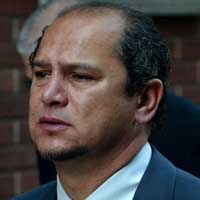 Schabir Shaik/Ngconde Balfour: Take two pills and call me when you’re released
Schabir Shaik/Ngconde Balfour: Take two pills and call me when you’re released
Schabir Shaik, fraud convict and controversial former financial adviser to President Jacob Zuma, was earlier this year released from his criminal sentence on medical parole. There was an outcry at the time, including from opposition parties, who questioned whether he had received preferential treatment.
At the time, former correctional services minister Ngconde Balfour was quoted as saying that Shaik was in “the final phase of his terminal condition”.
The medical-paroled and terminally ill Shaik has reportedly been seen a few times since his release in situations that cast doubt over his terminally ill status.
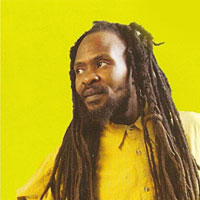 Ras Dumisani: An off-key affair
Ras Dumisani: An off-key affair
A terrifically badly sung South African national anthem at a sporting event took on political overtones when government officials and political parties involved themselves in the aftermath.
Singer Ras Dumisani wrote himself into South African folklore with an horrendous rendition of Nkosi Sikelel’ iAfrika ahead of a rugby match between France and the Springboks in Toulouse in 2009, in which he sang embarrassingly out of key and managed to get the words wrong.
The event caused an international uproar, with French rugby authorities, the South African embassy and South African political parties entering the fray and pronouncing on the affair.
Dumisani blamed his woes on bad equipment.
Yeah, right.
Come on Ras, professional singers take technical glitches in their stride and generally know the words to the song they are singing.
With excuses like that, maybe there’s a future for you in politics.
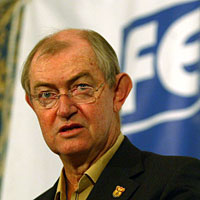 Alec Erwin: A bolt from the blue
Alec Erwin: A bolt from the blue
In 2006, following the controlled shutdown of one of the Koeberg units in late 2005, then-minister of public enterprises Erwin took exception to reports that he said saboteurs were behind an incident that led to the shutdown — the famous bolt in the works.
According to reports, he told Parliament that there was no evidence of any organised group being the agent of an act of sabotage.
“The circumstances around it is either a serious act of negligence, or it’s deliberate, but whatever it is, we have to investigate it exceptionally carefully and that’s what we’re doing,” Erwin said.
A “deliberate” act and sabotage have much in common as far as we’re concerned.
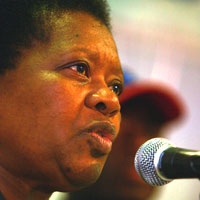 Buyelwa Sonjica: Doing her bit for electricity conservation
Buyelwa Sonjica: Doing her bit for electricity conservation
During South Africa’s electricity crisis of 2008, when the words “load shedding” became as much a part of South Africans’ vocabulary as “the traffic’s getting worse”, former minerals and energy affairs minister Buyelwa Sonjica felt moved to tell South Africans — following reports — that she had never advised them to go to bed early as a way of saving electricity.
“That speech didn’t say ‘Go to bed, go to bed, go to bed’,” she said.
This followed her unveiling a plan to get citizens to change their habits of electricity usage, in which she was reported as saying: “Go to sleep earlier so that you can grow and be cleverer. Boil less water; use the microwave rather than the stove; take a shower and not a shallow bath.”
Regardless of the fact that she may never have directly joined any dots between going to bed early and saving electricity, what is a person to make of the fact that she spoke of going to bed early while presenting a plan on conserving electricity? One can understand why reports emerged saying that “South Africans can save electricity by going to sleep earlier and boiling less water, Minerals and Energy Minister Buyelwa Sonjica told Parliament.”
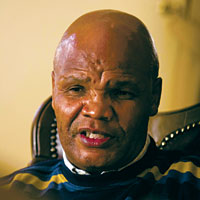 Leonard Chuene: Racing from responsibility
Leonard Chuene: Racing from responsibility
Disgraced suspended South African athletics boss Leonard Chuene became enemy number one in South Africa when, following some scathing reports, he admitted he had lied in the sensational Caster Semenya gender controversy.
Semenya rose to prominence this year as she progressed towards winning the 800m at the World Athletics Championships in Berlin. During the tournament, concerns were raised about her gender, and leaked reports alleged she had undergone gender tests at the championships.
The unfortunate leaks and insensitive handling of the matter led to much outrage in South Africa. However, it transpired that Semenya had also undergone such tests in South Africa before the championships, something that Chuene kept quite about until it was reported on in the media
According to a report in the Mail & Guardian, Chuene had been “under fire since September, after it became clear that he had lied about gender-verification tests conducted locally on the 18-year-old 800m world champion before the race in Berlin. Chuene claimed he had not known about the tests.
“He has since admitted to lying …”
Chuene alleges he did it to protect Semenya’s privacy. Were there not better ways of protecting her privacy than by knowingly letting an athlete who had undergone gender tests perform under the spotlight at one of the world’s most prominent events?
It seems no good can ever come of lying.
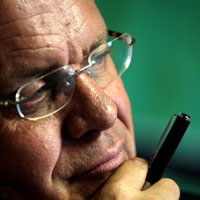 Carl Niehaus: Apartheid made me do it.
Carl Niehaus: Apartheid made me do it.
Earlier this year, the M&G broke the story of then-ANC spokesperson Carl Niehaus’s tearful admission of fraud.
“Niehaus has left a broad trail of bad debt and broken promises behind him,” said the report.
Why did he do it? Well, according to a statement from his lawyer shortly after the report emerged, it had something to do with “the long-term and deeply negative affects of his time spent in prison for his principled opposition to apartheid”.
Strangely enough, many who were jailed for their opposition to apartheid didn’t feel the need to resort to fraud.
Dodging responsibility 1; political credibility 0
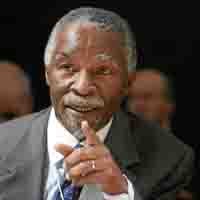 Thabo Mbeki: Crisis, what crisis?
Thabo Mbeki: Crisis, what crisis?
A number of publications quoted former South African president Thabo Mbeki as saying, during Zimbabwe’s controversial elections of 2008, that there was no crisis in Zimbabwe; he later attempted to clarify his comments, saying he was referring to the elections themselves, and not to a broader crisis in Zimbabwe.
Either way, this was a particularly bad choice of phrase, especially with the eyes of the world watching. The crisis in Zimbabwe informed every aspect of life for most citizens of that country, and trying to divorce the elections from that crisis was unwise.
A controversial choice of words that proved difficult to explain away.
“It is not good enough for him to say, as he did in New York this week, that he meant there was no election crisis in Zimbabwe and did not mean to suggest there was no broader economic crisis,” read an editorial from the M&G.
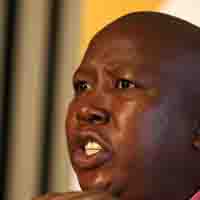 Julius Malema: Shoot to thrill
Julius Malema: Shoot to thrill
At a Youth Day rally in 2008, firebrand ANC Youth League leader Julius Malema told the crowd that the ANCYL was “prepared to die for Zuma”, and “We are prepared to take up arms and kill for Zuma.”
In the immediate aftermath of the speech, and following much condemnation, criticism and outcry over the violent nature of the words, Malema said that reports on the speech had been “blown out of proportion with a clear malicious intent and consequence”.
“We have noticed a distortion, misinterpretation, vulgar insults and defamatory comments which have been hurled against the ANCYL.”
Quite how this explained why he said what he said is unclear.
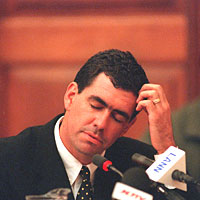 Hansie Cronje: Front-foot defensive
Hansie Cronje: Front-foot defensive
South Africans were shocked in 2000 when cricket’s golden boy, Hansie Cronje, admitted that he had been less than honest in his approach to the game, having become entangled in the sticky web of underworld bookmakers.
At the time, Cronje was quoted as saying: “In a moment of stupidity and weakness I allowed Satan and the world to dictate terms to me. The moment I took my eyes off Jesus my whole world turned dark.”
Ah, yes. A coordinated approach to making a bit of illegal money on the side and ensnaring at that time junior members of the Proteas set-up is so easily washed away.
Don’t think too many of us bought that.
Cronje’s indiscretions resulted in the government-appointed King Commission of Inquiry into match-fixing and related matters.
 Top Ten: your decade in review
Top Ten: your decade in review
Visit our special site for our review of the year and the decade in lists and multimedia. Books, movies, photos and politics — it’s all here.